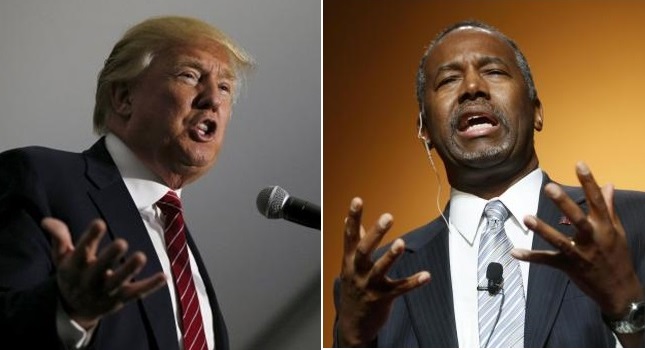Donald Trump's Presbyterian and Ben Carson's Seventh-day Adventists: A description of 2 Christian faiths

US Republican frontrunner Donald Trump has decided to pit his Presbyterian faith against the Seventh-day Adventist beliefs of his chief rival, Ben Carson.
At a rally on Saturday in Florida, Trump claimed that his Presbyterian faith is superior to his rival's Christian affiliation, News Max reported.
Following reports that Carson has sprinted ahead of Trump by a sizeable margin at least in Iowa, Trump could not hide his dissatisfaction.
"I love Iowa. And, look, I don't have to say it, I'm Presbyterian. Can you believe it? Nobody believes I'm Presbyterian. I'm Presbyterian. I'm Presbyterian. I'm Presbyterian . . . Boy, that's down the middle of the road folks, in all fairness. I mean, Seventh-day Adventist, I don't know about. I just don't know about," he said.
On Sunday, Carson was asked to respond to Trump's statement on Fox News, but said "I really refuse to really get into the mud pit" with his rival.
Is Trump correct in apparently assuming that his Presbyterian religion is a more genuine Christian faith than Carson's Seventh-day Adventist affiliation? Here is how News Max described the two Christian faiths.
Seventh-day Adventist Church
● The Church came into being after Baptist preacher William Miller predicted the literal Second Coming [advent] of Jesus Christ on Oct. 22, 1844. The prediction attracted many Christians who later joined the congregation. When Christ did not return to earth on the predicted date, some followers left.
● The Church was formally founded in 1863 when 20 delegates met in Battle Creek, Michigan, to outline the beliefs of their denomination.
● Adventists recognise Saturday as the Sabbath, the original seventh day of the Judeo-Christian week.
● Many Adventists "adopt the most healthful diet possible and abstain from the unclean foods identified in the Scriptures." This is because they view the body as the vessel for the Holy Spirit. As such, many do not indulge themselves in alcoholic beverages, tobacco, and narcotics.
● Seventh-day Adventists believe that those who die lay in an unconscious state until the return of Jesus Christ to earth.
● Adventists believe that Christ, having died on the cross, been resurrected, and ascended to heaven, will return to earth twice more: once to catch up the righteous, and finally to establish heaven on earth.
● During the first resurrection, the righteous will be glorified and caught up to meet their Lord.
● After Christ resurrects and takes up the righteous, he will reign in heaven with them for 1,000 years, while Satan and his angels will occupy a desolate earth with no living human inhabitants.
● At the end of the Millennium, Christ, His saints, and the Holy City will descend from heaven to earth. The unrighteous dead will be resurrected, and surround the city along with Satan and his angels. At that time, God will consume them in fire, thus cleansing the earth and the universe from sin and sinners forever.
● After Satan is destroyed, Seventh-day Adventists believe suffering and death will have passed away, and God will rule with the redeemed in a perfect environment of love, life, and joy.
Presbyterian Church
● The Church came into being when Martin Luther, the German monk, split from the Roman Catholic Church in the 16th century. John Calvin, a Frenchman, was inspired by the Protestant Reformation in the 1530s and relocated to Geneva, Switzerland, where he wrote "The Institutes of Christian Religion." Calvin's writings are generally credited as the foundations of the Presbyterian faith.
● Calvin's teachings John Knox, a native of Scotland, who founded the first Presbyterian churches.
● The church got its name from its system of governance, which gives elected laity known as "presbyters" the ability to govern in conjunction with ordained ministers.
● The faith was spread to America by Scottish immigrants. The first official Presbytery was established in Philadelphia in 1703. It spread to New Castle and Long Island by 1716.
● Presbyterian Minister John Witherspoon, a Scottish immigrant, was the only Christian minister to sign the US Declaration of Independence in 1776.
● Among famous Presbyterian are Lucile Ball, President Andrew Jackson and astronaut Buzz Aldrin.











